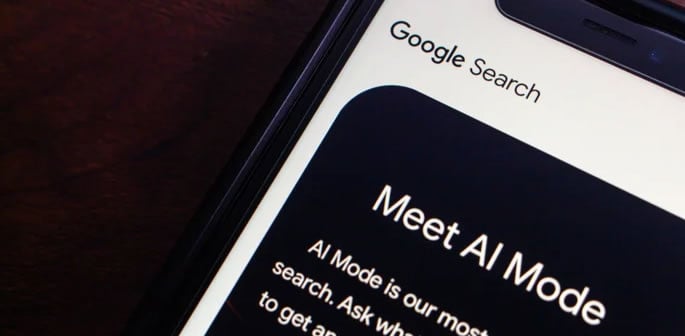"Publishers have no choice but to agree or lose their organic search."
Leading publishers have warned that Google’s AI-driven changes to search pose an “existential crisis” for the news industry.
Jon Slade, chief executive of the Financial Times, revealed his site has seen a “pretty sudden and sustained” decline of 25% to 30% in search traffic.
He suggested a “Nato for news” alliance to strengthen negotiations with AI companies.
The sharp drop highlights concerns that Google’s AI Overviews and new AI Mode are undermining traditional search referrals. These features summarise answers directly, often removing the need for users to click through to articles.
One senior tech executive told The Guardian:
“This is the single biggest change to search I have seen in decades.
“Google has always felt like it would always be there for publishers. Now the one constant in digital publishing is undergoing a transformation that may completely change the landscape.”
DMG Media, owner of the Daily Mail, said AI Overviews had reduced traffic to its sites by as much as 89%.
Alongside Guardian Media Group and the Periodical Publishers Association (PPA), it has called on the Competition and Markets Authority (CMA) to force Google to release traffic data from AI tools.
Publishers argue they are being pushed into unfavourable deals. According to several sources, companies face a choice: accept Google’s terms on content use or “drop out of all search results”.
Concerns extend beyond revenue.
Errors and bias in AI summaries remain a risk, despite improvements.
Apple promised to update a feature after its AI summaries falsely attributed news to the BBC.
Google disputes claims of widespread decline.
Liz Reid, its head of search, said AI was “driving more queries and quality clicks”.
She argued third-party reports rely on “flawed methodologies, isolated examples, or traffic changes that occurred prior to the rollout”.
But she admitted user behaviour is shifting.
Reid added: “The ‘vast’ web means traffic is decreasing to some sites and increasing to others.”
Google Discover, the company’s personalised content feed, has become a key referral source. But David Buttle, founder of DJB Strategies, said it offers poor long-term value.
He said: “Google Discover is of zero product importance to Google at all.
“It allows Google to funnel more traffic to publishers as traffic from search declines… Publishers have no choice but to agree or lose their organic search.
“It also tends to reward clickbaity type content. It pulls in the opposite direction to the kind of relationship publishers want.”
Publishers are also battling AI companies over copyright.
Some, including the FT, Guardian, and Axel Springer, have signed deals with OpenAI. Others, such as the BBC, are pursuing legal action.
Chris Duncan, former News UK executive, warned: “Content is disappearing into AI products without serious remuneration, while AI summaries are being integrated into products so there is no need to click through, effectively taking money from both ends.
“It is an existential crisis.”
Newsrooms are also experimenting with their own AI products. The Washington Post and FT have launched chatbots sourcing answers only from their own journalism.
Christoph Zimmer, chief product officer at Der Spiegel, said building direct relationships with readers remains vital.
He said: “This is a continuation of a longstanding trend.
“However, this affects brands that have not focused on building direct relationships and subscriptions in recent years even more strongly.
“Instead, they have relied on reach on platforms and sometimes generic content.”
“What has always been true remains true: a focus on quality and distinct content, and having a human in charge rather than just in the loop.”
Industry executives believe the next battle will focus on live news, as AI models increasingly summarise breaking stories in real time.
Saj Merali, chief executive of the PPA, said the issue is about balancing technology with public trust:
“What doesn’t seem to be at the heart of this is what consumers need.
“AI needs trustworthy content. There is a shift in how consumers want to see information, but they have to have faith in what they are reading.
“The industry has been very resilient through quite major digital and technological changes, but it is really important we make sure there is a route to sustain models.
“At the moment, the AI and tech community are showing no signs of supporting publisher revenue.”






























































